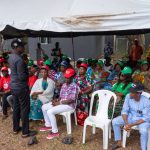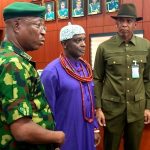Chibok Girls: Israel Sends Counter-Terrorism Team
 President Goodluck Ebele Jonathan said Sunday in Abuja that he was very optimistic that with the entire international community deploying its considerable military and intelligence-gathering skills and assets in support of Nigeria’s efforts to find and rescue the abducted Chibok girls, success will soon be achieved.
President Goodluck Ebele Jonathan said Sunday in Abuja that he was very optimistic that with the entire international community deploying its considerable military and intelligence-gathering skills and assets in support of Nigeria’s efforts to find and rescue the abducted Chibok girls, success will soon be achieved.
Speaking in a telephone conversation with the Israeli Prime Minister, Mr. Benjamin Netanyahu who called Sunday to convey his country’s sympathy and solidarity with Nigeria, President Jonathan welcomed the offer by Mr. Netanyahu to send a team of Israeli counter-terrorism experts to assist in the ongoing search and rescue operations. Search for the abducted girls, over 200, has assumed international dimension with US, France, Britain, Chad, Cameroon and other nations offering help to rescue the schools now believed to have been forcefully married to their captors in different countries.
Some of the girls that managed to escape have said they were driven in ten trucks into the dreaded Sambisa forest. “they took us and burnt the schools down”, one said at a public gathering in Chibok, Borno State, North East Nigeria. In a video footage obtained by the BBC in which some girls targeted by the kidnappers told how they had escaped, one said she had hidden in a tree overnight, while another said she had fled after being put in a truck and taken into a forest, according to a report by the BBC’s John Simpson from Abuja.
Meanwhile Nigeria’s military had advance warning of an attack on the town where some 270 girls were kidnapped but failed to act, Amnesty International said today.
The human rights group says it was told by credible sources that the military had more than four hours’ warning of the raid by Boko Haram militants.
Fifty-three of the girls escaped soon after being seized in Chibok on 14 April but more than 200 remain captive. Nigeria’s authorities say they “doubt the veracity” of the Amnesty report.
“If the government was aware [beforehand] there would have been an intervention [against the militants],” Nigerian Information Minister Labaran Maku told BBC World TV.
However, he said the authorities would still investigate the claims.
Nigerian President Goodluck Jonathan said on Friday that he believed the schoolgirls were still in his country and had not been moved to neighbouring Cameroon.
“There are stories that they have moved them outside of the country. But if they move that number of girls to Cameroon, people will see, so I believe they are still in Nigeria,” Mr Jonathan told journalists at a meeting of the World Economic Forum in Abuja.
Amnesty says it was told by several people that the military in Maiduguri, capital of the north-eastern Borno state, was informed of the impending attack on Chibok town soon after 19:00 local time.
It says that a local official was contacted by herdsmen who said that armed men had asked them where the Government Girls’ Secondary School was located in the town.
Despite the warning, reinforcements were not sent to help protect the town in the remote area, which was attacked at around midnight, Amnesty says.
One reason, the rights group says, was a “reported fear of engaging with the often better-equipped armed groups”.
Amesty’s Africa Director Netsanet Belay said it amounted to a “gross dereliction of Nigeria’s duty to protect civilians”.
A father of one of two of the missing schoolgirls told the BBC’s John Simpson that he believed there was “politics” behind the kidnappings because there was prior information that the militants would be coming to Chibok.
Boko Haram has admitted capturing the girls, saying they should not have been in school and should get married instead.
In a video released earlier last week, leader Abubakar Shekau threatened to “sell” the students. Teams of experts from the US and UK – including military advisers, negotiators and counsellors – have arrived in Nigeria to help locate and rescue the abductees.
Seven American military officials arrived on Friday, with more expected to come on Saturday, including three FBI personnel.
Jump media playerMedia player helpOut of media player. Press enter to return or tab to continue.
Boko Haram, whose name means “Western education is forbidden” in the Hausa language, began its insurgency in Borno state in 2009.
At least 1,200 people are estimated to have died in the violence this year alone.
The Nigerian leadership has been widely criticised for its perceived slow response to the girls’ kidnapping.
More protests were held in the British capital, London, and Nigeria’s main city, Lagos, on Friday.
Speaking to the BBC’s World Have Your Say programme, Mr Maku said it was important to remember that the army was not fighting an “easy war” against Boko Haram, which operates over a huge area in the remote north.








